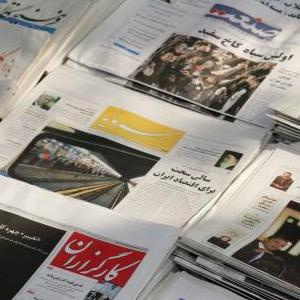Tehran's Daily Newspaper Review

Ayatollah Khamenei met public and private sector executives on Wednesday evening. The meeting, according to the Iranian Supreme Leader, “is a symbolic act at the current critical moment to demonstrate the significance the Islamic Nezam attaches to economics and economic progress.” In his speech, the Leadership called for the government’s sensitivity toward every single case of corruption in governmental organizations, and empowerment of the private sector.
For Ayatollah Khamenei’s speech, Iran chose the headline “Achieving the top regional position demands economic jihad.” Iran also quoted Foreign Minister Ali-Akbar Salehi, now on a trip to Moscow, that “Iran welcomes any initiative for commencement of constructive negotiations.” The newspaper also reported the one billion dollar loss of the insurance industry after approval of the 90 thousand dollar “blood money” rate by the Judiciary. Ali-Akbar Javanfekr again defended publication of Iran's special edition on hejab in the newspaper’s editorial, claiming that it is a product of Iran's counter-attack in the ‘soft war’ against West. He also criticized politicians who made a mountain out of a molehill about Khatoon.
“The inimical goal of sanctions will fail with the economic jihad of officials and people” Jomhouri-ye Eslami quoted Ayatollah Khamenei. Iran has welcomed Russia's ‘step-by-step’ plan to solve the dispute over its nuclear program, Jomhouri-ye Eslami reported. As usual, the newspaper did not miss Hashemi Rafsanjani’s remarks: “The end does not justify the means” Rafsanjani stated, expressing sorrow that in Iran today “unfortunately revolutionary figures and Muslims with good will resort to slander, lies and unfair treatment and what makes it worse, justify them under sacred labels.”
From the Supreme Leader’s speech, Kayhan ran the headline “economic jihad, an effective weapon against the enemy’s sanctions”. The newspaper interviewed Ali Ramazan al-Ousi, Iraqi professor at London University, who verifying Ayatollah Khamenei’s prophecy that the Islamic Awakening will advance into the heart of Europe, called the recent riots in Britain “the intifada of the British underprivileged”. Kayhan also published the statement released by 239 MPs in condemnation of the crackdown on British youth by David Cameron’s government. “Of Mice and Men” was Kayhan’s editorial, written by Mohammad Imani-- a lengthy treatise on the role of Reformists in the Fetneh (the 2009 protests sparked by controversial presidential election) which accused them of nefagh (hypocrisy): claiming to be following the path of Imam Khomeini while in the end, allying with Israel, the US, and counter-Revolutionary groups and Baha’is.
From Ayatollah Khamenei’s speech, Resalat chose the statement: “fighting economic corruption is an important principle.” The newspaper reported of the leadership vacuum, poor organization and differences between the former and current leaders of the Reform front in a piece titled “United Reformist Front, from scenario to reality”. In Resalat’s editorial, member of the parliament Heshmatollah Falahatpisheh warned about overreliance on Moscow in the nuclear saga.
Shargh chose “One rate, two figures” as its top headline to report on the contradictory figures presented by the Central Bank and the Statistics Center of Iran on the inflation rate, the last key economic index disclosed by the government, as Shargh claimed. The newspaper also reported of the first deal made in the crude oil bourse, expressing concern that the batch has been purchased below the real price, and the name of the purchaser has not been revealed. Shargh’s editorial, which was written by economist Hossein Raghfar, elaborated on the current state of inflation and its impact on the Iranian economy.
Tehran-e Emrooz gave a conspicuous coverage of Qalibaf’s iftar ceremony (breaking the fast at dusk) with ambassadors of Muslim countries, showing that just like the 2005 presidential campaign, the Tehran mayor’s PR firm believes that benefit lies in ostentation. “The fate of the nation hinges upon realization of the 20-Year Vision Document,” Tehran-e Emrooz quoted Ayatollah Khamenei, on top of a remark by a Principlist member of parliament who claimed that 67% of the Fourth Five-Year Development Plan, drafted by Khatami's government but largely to be enforced during Ahmadinejad's administration, has not been materialized. The success of Moscow’s step-by-step plan relies on the attitude of the six global powers negotiating with Iran, Tehran-e Emrooz’ editorial argued.
* Note: Vatan-e Emrooz does not publish on Thursdays.
Trouble with understanding some terms? Check our Glossary of Iranian Political Terms.
Briefing
Hamshahri (Citizen) is the official daily newspaper of Tehran's Municipality. Its general directions in politics, culture and economy are determined by the mayor of Tehran, currently Mohammad Baqer Qalibaf.
Iran is the official organ of the administration.
Jomhouri-ye Eslami (The Islamic Republic) was known as the official organ of the Party of the Islamic Republic, founded in 1979 and disbanded in 1987. Currently, it is an open critique of Mahmoud Ahmadinejad's policies and is known to be a mouthpiece of Akbar Hashemi Rafsanjani.
Kayhan (Universe) is a hard-line conservative newspaper. Its editor-in-chief –currently Hossein Shari’atmadari- is appointed by Iran's Supreme Leader. Shari’atmadari’s editorials often spark off controversy and debate inside Iranian political circles.
Khabar (News) is a principlist daily newspaper which adopts a critical stance towards Ahmadinejad's policies.
Resalat (Mission) belongs to the moderate wing of the principlist camp. Resalat’s best known analyst is Amir Mohebbian, its political editor.
Shargh (East) is a moderate reformist newspaper. It was the most popular and influential reformist newspaper in its first period of publication which lasted from August 2003 until September 2006.
Tehran-e Emrooz (Tehran Today) is a ‘principlist reformist’ newspaper, connected to Mohammad Baqer Qalibaf.
Vatan-e Emrooz (Motherland Today) -which started its publication in November 2008-, belongs to Mehrdad Bazrpash, the thirty-old pro-Ahmadinejad politician who is also head of Iran's second largest auto manufacturer company, Saipa. Vatan-e Emrooz is a supporter of the president’s policies.

